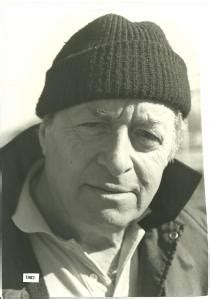A Quote by Bertrand Russell
If a man is offered a fact which goes against his instincts, he will scrutinize it closely, and unless the evidence is overwhelming, he will refuse to believe it. If, on the other hand, he is offered something which affords a reason for acting in accordance to his instincts, he will accept it even on the slightest evidence. The origin of myths is explained in this way.
Related Quotes
Disregarding all evidence to the contrary, the student of Truth will maintain that he lives in a PERFECT Universe and among people potentially perfect. He will regulate his thinking to meet this necessity and refuse to believe in its opposite. At first he may be influenced by conditions, and he may appear weak, but as time goes on he will PROVE TO HIMSELF that his position is a correct one, for that which appears imperfect will begin to slip from his experience
Unless a writer lives with a periodic delusion of his greatness, he will not continue writing. He must believe, against all reason and evidence, that the public will experience a catastrophic loss if he does not complete his novel. The public is just clamoring to give him his fame. From the book Dare to be a Great Writer: 329 Keys to Powerful Fiction by
When a man finds that it is his destiny to suffer, he will have to accept his suffering as his task. . . . He will have to acknowledge the fact that even in suffering he is unique and alone in the universe. No one can relieve him of his suffering or suffer in his place. His unique opportunity lies in the way in which he bears his burden.
When a man has offered in sacrifice all that he has for the truth’s sake, not even withholding his life, and believing before God that he has been called to make this sacrifice because he seeks to do his will, he does know, most assuredly, that God does and will accept his sacrifice and offering, and that he has not, nor will not seek his face in vain.
When a man finds that it is his destiny to suffer, he will have to accept his suffering as his task; his single and unique task. He will have to acknowledge the fact that even in suffering he is unique and alone in the universe. No one can relieve him of his suffering or suffer in his place. His unique opportunity lies in the way in which he bears his burden.
I destroy because for me everything that proceeds from reason is untrustworthy. I believe only in the evidence of what stirs my marrow, not in the evidence of what addresses itself to my reason. I have found levels in the realm of the nerve. I now feel capable of evaluating the evidence. There is for me an evidence in the realm of pure flesh which has nothing to do with the evidence of reason. The eternal conflict between reason and the heart is decided in my very flesh, but in my flesh irrigated by nerves.
As long as the reason of man continues fallible, and he is at liberty to exercise it, different opinions will be formed. As long as the connection subsists between his reason and his self-love, his opinions and passions will have a reciprocal influence on each other, and the former will be objects to which the latter attach themselves.
Jesus has chosen, even in a resurrected, otherwise perfected body, to retain for the benefit of His disciples the wounds in His hands and in His feet and in His side-signs, if you will, that painful things happen even to the pure and the perfect; signs, if you will, that pain in this world is not evidence that God doesn't love you; signs, if you will, that problems pass and happiness can be ours.
Self-righteousness exclaims, "I will not be saved in God's way; I will make a new road to heaven; I will not bow before God's grace; I will not accept the atonement which God has wrought out in the person of Jesus; I will be my own redeemer; I will enter heaven by my own strength, and glorify my own merits." The Lord is very wroth against self-righteousness. I do not know of anything against which His fury burneth more than against this, because this touches Him in a very tender point, it insults the glory and honor of His Son Jesus Christ.
For some reason or other man looks for the miracle, and to accomplish it he will wade through blood. He will debauch himself with ideas, he will reduce himself to a shadow if for only one second of his life he can close his eyes to the hideousness of reality. Everything is endured-disgrace, humiliation, poverty, war, crime, ennui-in the belief that overnight something will occur, a miracle, which will render life tolerable.


































